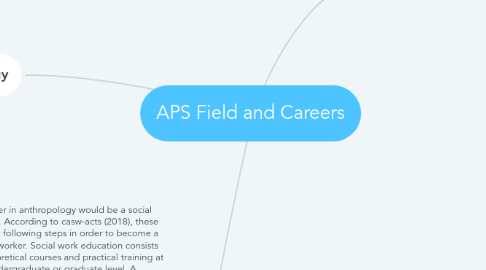APS Field and Careers
Pablo Linaresにより

1. Anthropology
1.1. A career in anthropology would be a social worker. According to casw-acts (2018), these are the following steps in order to become a social worker. Social work education consists of theoretical courses and practical training at the undergraduate or graduate level. A Bachelor of Social Work is the minimum educational requirement for entry into the profession. Postgraduate education leading to a master’s or doctoral degree is also available. (see psychology for details on masters and doctoral degree) A four-year undergraduate program is required for a bachelor’s degree. Persons who have a Bachelor of Social Work degree may obtain a master’s degree after one year of postgraduate studies. Those who have a degree in another discipline would require a two-year postgraduate program in social work to obtain the master’s degree in social work. (How to Become A Social Worker, 2018)
1.2. According to Discover Anthropology,(2018), anthropology is: the study of people throughout the world, their evolutionary history, how they behave, adapt to different environments, communicate and socialise with one another. The study of anthropology is concerned both with the biological features that make us human (such as physiology, genetic makeup, nutritional history and evolution) and with social aspects (such as language, culture, politics, family and religion). Whether studying a religious community in London, or human evolutionary fossils in the UAE, anthropologists are concerned with many aspects of people’s lives: the everyday practices as well as the more dramatic rituals, ceremonies and processes which define us as human beings. (What is Anthropology, 2018)
2. Psychology
2.1. According to Saul McLeod (2011), psychology is: the scientific study of the mind and behavior. Psychology is a multifaceted discipline and includes many sub-fields of study such areas as human development, sports, health, clinical, social behavior and cognitive processes. (what is Psychology, 2011)
2.2. A career in psychology is a clinical psychologist. According to Learn How to Become (2018), a clinical psychologists are chiefly concerned with understanding the mental, emotional, and behavioral problems affecting patients, ranging from young children to aging seniors. (Clinical Psychology Degrees and Careers, 2018). The following steps are require in order to become a clinical psychologist: You must first earn a bachelor and then masters degree in psychology. This is done by enrolling and performing well in a university level psychology program (3-5 years). You must then apply for and receive a doctorate degree which is extremely competitive (Hundreds of applications are received but only a dozen are accepted.) , become clinically trained, and finally become and remain licensed. (Clinical Psychology Degrees and Careers, 2018)
3. Sociology
3.1. According to The Department of Sociology at UNC (2018), sociology is the study of human social relationships as well as institutions. The topics within sociology are very diverse, ranging from the family to the state, the divisions of race and social standing to the shared beliefs of a common culture, as well as social stability to radical change in the entirety of societies. (What is Sociology, 2018)
3.2. A career in Sociology is a guidance counselor. According to BetterHealth (2018): A guidance counselor helps all students, academically, personally, socially, and in preparing for a career. The counseling system is in place in order to help students achieve in their future career, and in their social interactions. Counselors are available from Kindergarten through to grade twelve and begin by helping students to grow there own self-understanding, as well as acceptance for themselves. (What is A Guidance Counselor, 2018) These are the following steps in order to become a guidance counselor according to OSCA (2018): Step One Graduate from university with a three or four year degree. Step Two In order to be a school counsellor, you need to have your teacher qualifications. Graduate from any of the University Faculties of Education and become a certified teacher. Step Three Apply to teaching positions, including supply teaching and/or volunteering. Step Four Enroll in the Additional Qualification Course - Guidance and Career Education ( How to Become A Guidance Counselor, 2018)


